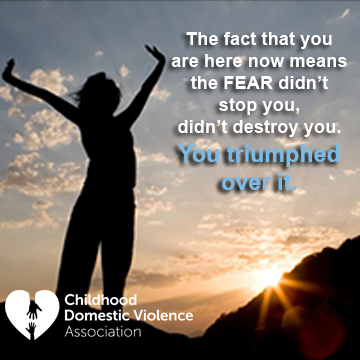Childhood Domestic Violence Teaches Us the Lie of Guilt
Children think emotionally, not rationally. When you were exposed to domestic violence as a child, your brain drew the wrong conclusions: “I couldn’t stop it, but I should have.” “I was there, so it must have been my fault. It happened because of me.” This creates a tremendous sense of guilt, and the burden of carrying it weighs you down. It makes you feel ashamed and unworthy.
My Parents Fought a Lot Growing Up
My mother and stepdad fought constantly. I felt bad seeing her in pain. I felt very guilty that I was not able to help her. And yet, a part of me was also frustrated and desperate for the fighting to stop. So, I remember yelling at her as well. I think I wanted to make her feel bad, hoping this would somehow bring the fighting to an end, as I didn’t know how else to effectively voice my frustration. I was tired of seeing it happen repeatedly. But then, each time I yelled at her, I knew I was hurting her feelings, and she didn’t deserve it. This made me feel even guiltier and somehow directly responsible for what was unfolding in our household.
I Felt Guilty about Everything
As I got older, feeling “guilty” was a natural response for me. If someone was hurting in my presence and I couldn’t find a way to fix it, I took on the burden of that pain and a lot of the responsibility for it. I felt horrible about it and always felt people would be disappointed in me if I couldn’t help them with their problems.
I Grew to Learn How to Feel for Others Without Feeling Guilty
It wasn’t until I got older that I began to realize I could feel angry about or empathetic with others’ circumstances without feeling somehow guilty or responsible for them. As an adult, your adult brain is now developed to understand this logic rationally, which you could not comprehend as a child. It was especially after my own experience with domestic violence as an adult that I began to realize violence between parents is never a child’s fault. It certainly wasn’t my children’s fault when it happened in our home. So, therefore, it couldn’t have been my fault as a child when it was happening in my childhood home. I learned to accept this rationally. However, I struggled to truly accept it emotionally, as the habit of feeling guilty was deeply ingrained.
Overcoming My Guilt Taught Me How to Take Control
Over the years, life experiences have contributed to a gradual shift in my thinking and feelings regarding guilt. I began to see how I had been controlled by the GUILTY lie that I absorbed as a child, and this was most obvious when I had to unlearn it in order to leave my own abusive situation. I knew we were never going to be a family, and I felt really guilty for uprooting my children. However, I knew it was something I had to do because it would ultimately be in our best interest.
Sharing My Story Helped Set Me Free from Guilt
Thankfully, friends and advocates alike helped me realize I didn’t have to linger in that place, and I did the right thing – the thing I had wanted to do for my mother all those years back, which was get her to leave the abuse behind. By sharing my story with others and rediscovering my past through their eyes, I finally began to realize and accept the truth emotionally – that I was never guilty as a child about what happened in my home.
The opposite of GUILTY is FREE. Overcoming my sense of guilt and feeling free was something that took a long time for me. But the destination was worth the journey. I’ve learned to let go of the guilt. I’ve realized that it’s a useless emotion for a former child of domestic violence that does nothing but hold you accountable for things that are not your fault and are out of your control. For so many years, I was desperate to fix things that just weren’t meant for me to fix – in an attempt to make up for something in the past that was never my fault. I now know that what I lived through as a child is nothing for me to feel guilty for, and I’m happy to finally be FREE of this burden.
Lisa Floyd
From the opening scene of THE CHILDREN NEXT DOOR

